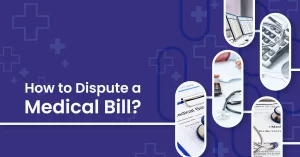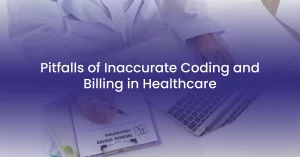Medical billing businesses are in charge of improving the medical billing process. Nevertheless, loss within the medical billing process can result from various sources. What happens if you don’t pay medical bills? How unpaid medical bills might interfere with the medical billing services procedure and cause a decline in payments. We shall clarify this situation in this article.
What Are Medical Bills?
A medical bill is your healthcare practitioner’s statement detailing the amount the patient owes. Due to processing time and whether the provider had to send an appeal or to support evidence to the insurance carrier, it may take longer than 30 days for you to receive the bill. The hospital bill should reflect:
- Payments made when the service was rendered
- The amount your insurance provider paid
- The amount you still owe
How many individuals are therefore impacted by medical debt? You must treat your medical costs carefully, even though unpaid medical bills impact many people In terms of healthcare revenue cycle management. There are solutions for you to think about if you’re having difficulties paying your medical bills, even though leaving your medical debt unpaid has some severe repercussions.
There are choices available for people and families struggling to pay their medical expenses. Consider the consequences of not paying patient payments. You may control your medical costs by using free patient advocates, financial aid programs, and negotiating strategies.
Understand Medical Bills Issues and Their Solutions
The following steps can help you comprehend your medical bills and resolve medical billing issues:
- Take a close look to determine precisely which provider provided the bill. Sometimes healthcare provider organizations have names similar to those of the hospitals where they work.
- Remember that you can receive bills from doctors you very briefly or never met. For instance, you might never meet the radiologist who reads your X-rays, and most of an anesthesiologist’s services are rendered while asleep during surgery.
- Verify the accuracy of your medical bills. Check if the dates on the bill correspond to the times you were hospitalized. The provider’s billing office brings up any charges incorrectly dated or not identified on the medical bill.
- Get in touch with the billing department of the relevant provider if you believe that the hospital or doctor’s bill contains an error. Usually, the phone number is printed on the bill. Keep a log of the names, remarks, and call dates of everyone you talk. Submit a certified letter to the company if the issue is still not understood or resolved after several phone calls. Your letter should contain copies of all relevant papers and a thorough explanation of the problem. Keep all of your original documents. Within 10 days, ask for a response.
- Compare any Explanation of Benefits (“EOB”) from your insurer with your bills. Contact your provider if you need help determining what your insurance has or hasn’t paid. Make sure your insurance provider received and processed all of your invoices by calling them, or if you have bills but no EOBs that match the services you are being charged for, call them.
- Contact the business and request an explanation if you believe the insurance company’s payout was insufficient.
- Contact the Health Education and Advocacy Unit if you receive no response or cooperation.
- Write the account number on your check to ensure that the efficient medical billing office correctly credits your account after paying a bill.
What happens if you don’t pay medical bills?
Here’s what happens if you don’t pay medical bills.
Penalties
What happens if you don’t pay medical bills due to late penalties? And what can you do? Spend some time reading the documents before getting medical attention. Using this information will make it simpler to comprehend the conditions and limitations that apply if you cannot pay your medical costs within the authorized timeframe. If you wait to make your payment, you risk paying extra late fees or interest. Your state’s legislation will determine whether or not you are subject to late fines or interest. This will also establish whether it’s appropriate for your medical provider to add extra fees to your medical bill.
Adverse effects on your credit score
Do not disregard your medical costs, regardless of your financial circumstances. If you don’t pay your medical bills, you run the chance of having to deal with a debt-collecting company. And the last thing you want is to let a few overdue medical bills damage your credit.
Legal action
What is the worst-case scenario, excluding late fees and credit score ruination? A healthcare provider might sue you if you fail to get a debt collection firm to step in. What should you anticipate if your healthcare provider sues you for unpaid medical bills? You can be forced to settle your medical debt less traditionally if the case over your unpaid medical expenses goes to court. For instance, you might have money taken out of your paycheck to pay off debt.
What To Do If Your Medical Bills Are Unpaid?
- If possible, take proactive measures.
- Recognize the repercussions of unpaid medical bills.
- Recognize the impact medical bills have on your credit.
- Look for inaccuracies in your medical bills.
- Discuss medical bills.
- Seek assistance with your medical bills.
- Take into account declaring bankruptcy to pay medical bills.
- Be aware of potential medical expenses during COVID.
Proactive Measures
Before undergoing a potentially expensive treatment, there are a few actions you may take to avoid any surprises and prevent adding to your medical bill. If you want to pay cash:
- Request a rate that is comparable to what insurance companies pay in advance.
- Verify any medical bills you get to ensure they are accurate.
- Find out from your insurer whether any or all of it is covered.
- If not, call the supplier who sent the bill.
- Do not anticipate that speaking with someone in the patient financial counselling or billing departments will be your final stop.
- Offer to pay the majority of a bill right away if you can.
Medical advocates claim that by doing this, they can frequently receive a 15–20% “quick pay” discount.
Repercussions of unpaid medical bills
Your doctor’s office or the hospital may make several attempts to get in touch with you regarding the outstanding balance when medical bills go unpaid.
You may receive calls, text messages, emails, or letters from debt collectors. You may also have the chance to negotiate the amount of your debt payment.
If you ignore medical debt any longer, it can lower your credit score and lead to legal action against you. However, keep in mind that you do have rights in these circumstances. Collection agencies are not allowed to phone you at odd hours, harass you, or threaten to arrest or deport you.
Impact of medical bills on your credit
Your credit score can suffer dramatically if you have unpaid medical debt. However, the three credit reporting bureaus will start implementing significant changes to how medical debt impacts your credit score on July 1.
The first step is automatically delete settled medical debt from individuals’ credit reports. Second, a year will be added to the 180-day waiting period before unpaid medical debt appears on credit records. Finally, as of 2023, your credit score won’t be impacted if your outstanding medical debt is $500 or less.
Check inaccuracies in your medical bills
Start by calling your doctor directly if you are alarmed by a medical bill or believe it to be the consequence of an error. According to Gross, procedures are frequently miscoded, leading to inaccurate billing that can be expensive.
She advises, “You’re going to call the doctor first.” “The number on the bill is frequently an outside billing business, and since they are paid a portion and only care about getting their money, they won’t do anything for you. Talk to the provider right away about it.
You have the right to look at an itemized bill and check for any unauthorized charges. Watch out for multiple billing errors and incorrect hospital expenses.
You can find yourself in a perplexing and ambiguous situation where you are caught between your insurance and medical providers. It may seem like full-time detective work to understand the costs associated with various operations and what insurance coverage includes and excludes. The issue can become more complicated if you receive medical care from several providers.
However, there are some steps you may take to ensure that your medical bill is accurate and that, if debt collectors get in touch with you, they are not trying to collect on inaccurate medical bills or infringing on your rights.
- Carefully review your medical invoices to ensure that everything is accurate and that you received all the prescribed treatments.
- Verify that the medical bill is yours and that your name, insurance details, and billing address are all correct.
- If any elements on your medical bill are confusing to you, ask your clinician for a plain English explanation.
- Request confirmation of the debt and information about the debtor and the medical bill collected from debt collectors.
Discuss Medical Bills
Your medical bill can be negotiated before and after being sent to collections. Medical providers can agree to a lesser payment in one single sum or offer a discount if you pay a sizable down payment up front and pay the balance over time.
Hospitals and other healthcare facilities might be especially eager to provide uninsured patients with a discount.
Seek Assistance Paying the Medical Bills
Finding a patient advocate is a great place to start if you need assistance paying medical expenses and to know how to dispute a medical bill?
A nonprofit organization called The Patient Advocate Foundation provides case management services and informational materials. Patients must have a chronic, severe, and disabling disease for free case management.
Support in paying for necessities like food, rent, utilities, and transportation and assistance with low-cost health care and prescription programs are all possible examples of this support.
Additionally, for-profit private organizations provide patient advocacy and medical bill management services.
Even if you think you might not be qualified, check with your hospital, and consider submitting a financial aid application. Hospitals may also provide financial support to qualified low-income individuals who cannot pay their medical fees.
File Bankruptcy for Medical Bills
In some circumstances, declaring bankruptcy to erase your medical debt may be your best option. However, thoroughly consider your options before making this choice. Your FICO credit report may contain bankruptcy information for up to ten years, making it more challenging for you to borrow money in the future. Before taking this route, speak with a bankruptcy counsel.
Conclusion
Usually, checks that bounce to the credit bureau are used to pay medical bills. This implies that some accounts will be flagged as past due, and borrowers may pay far more than they should for collection reasons. The issue with medical debt is that it can take a very long time to settle because the healthcare system has so many laws and regulations.
Planning is one of the best strategies to reduce expensive and unforeseen medical expenses, just as prevention is the best treatment for maintaining good health. For screens and other treatments, for example, look around to be sure you won’t be charged more than necessary rather than immediately going wherever your primary care physician suggests you. It becomes much more challenging to bargain for a lower price once you have undergone surgery. Even with the most common treatments and standard procedures, you may have a sizable medical debt.




